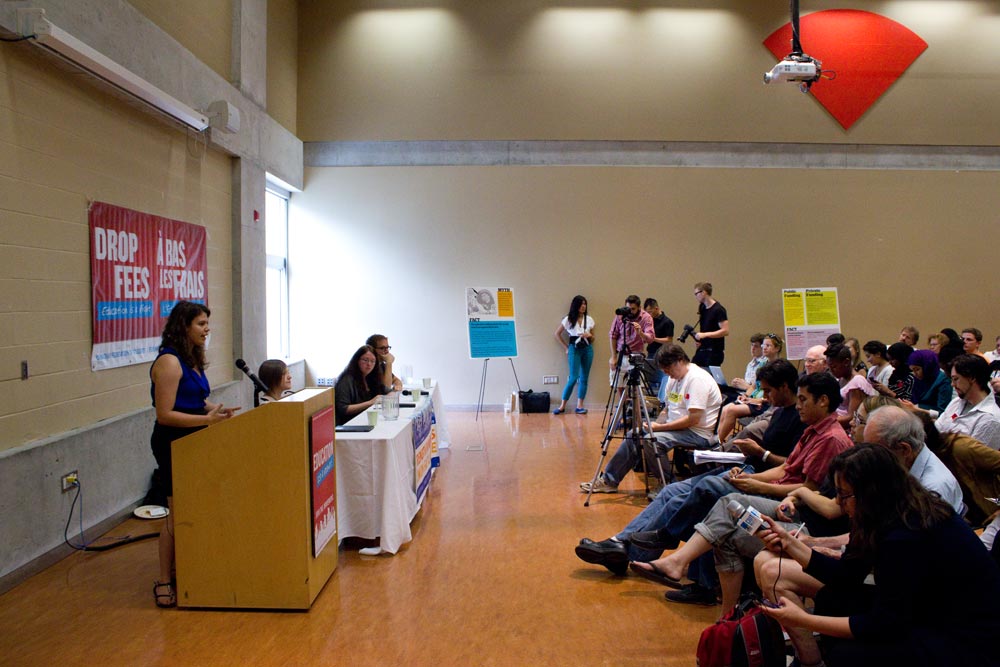By Luc Rinaldi
On Thursday evening, Ryerson played host to the Quebec-Ontario Student Solidarity Tour, a cross-province speaking circuit that, in nine cities in as many days, has urged Ontario’s students to support–and perhaps join–what has become the longest and largest student strike in Canadian history.
The panel, entitled “Lessons from Quebec,” drew about 200 to an SCC hall to hear stories and strategies from three student leaders at the forefront of the Quebec protests. While the RSU-backed event delved into the history and struggles of students east of the border, its focus–developing ways in which Ontario can join ranks with its Francophone neighbour–was clear.
“The most important solidarity we can offer is fighting our own government’s policies,” said Sarah Jayne King, chair of the Canadian Federation of Students for Ontario, one of about three-dozen sponsors of the tour. “(They) have led to Ontario having the highest tuition fees in the country.”
The trio of speakers that King introduced echoed her sentiments, claiming that widespread strikes in Ontario would motivate students in Quebec, who have already been protesting for more than 150 days. Activist Hugo Bonin of CLASSE, the largest of the student coalitions spearheading the protests, added that there’s nothing preventing Ontario from mimicking Quebec’s efforts.
“We didn’t reinvent the wheel in Quebec and we don’t have a secret recipe,” he said. “You have to find your own ways to mobilize… If you work hard enough, you can have the kind of movement we have in Quebec.”
The reality, however, is that that kind of movement has yet to garner nearly the same momentum in Ontario as it has in Quebec where, on March 22, 300,000 marched through the streets of Montreal. The lack of support might seem surprising given the fact that Ontario’s average tuition fee is $6,640, more than double Quebec’s, which, at $2,519, is the lowest in the country. Ontario’s tuition fees have also increased by 71 per cent since 2006, a similar increase to the one proposed by Quebec’s Charest government, which ignited the protests.
“I think that Ontario students have a reason to be very angry with where we’re at with post-secondary education,” said Melissa Palermo, the RSU’s vice-president of education. “And I think we need to figure out how to take action in the best way possible.”
What that way is for Ryerson, she added, is up to students.
“We support whatever students want to do, and we want to put measures in place at the grassroots level so that students can make their own decisions,” she said. “If people look to Quebec and say that’s what we want to do, then we support that.”
For now, those grassroots measures include RSU general assemblies and action committee meetings, where students can voice their opinions, in favour of a strike or otherwise. Like the movements at various campuses across Quebec, a Ryerson strike would have to win the support of students at a general assembly before it could materialize.
Bonin and the other speakers, Dawson Student Union chair Audrey Deveault and UQAM student Marianne Breton Fontaine, stressed that a student movement is not an overnight process, citing their own two-year struggle in Quebec before protests began in February 2012. But Bonin, for one, thinks that that struggle may soon come to fruition.
“Eventually you will see your prime minister is actually scared of a bunch of students,” said Bonin. “That’s when you’ll know you’re pretty damn close to winning.”
[nggallery id=47]










Leave a Reply